APT Renovation – Design & Build can take care of all aspects of a bespoke basement conversions in London from the design, excavation of core base, groundworks, waterproofing, tanking, understructure construction to fit outs and renovation of existing cellars and basements. Our own construction team will undertake the whole fit-out phase of the basement conversion project. The major benefit of our service is that you can work with a single team of groundwork specialists under one roof.
Over past years we managed to transform exceptional basement substructures. We combined client ideas and our expertise in constructing bespoke ground rooms and cellars. Our in-house team of architectural designers and understructure engineers who can create and transform any space you may desire.
We are also able to work on larger projects like “mega basements” and “super substructures” as well as large entertainment rooms, home cinemas, gyms, interactive children’s playroom, a study room, swimming pools and ground room spa spaces.
GUEST LOUNGE

STUDY ROOM

PLAYGROUND

GYM
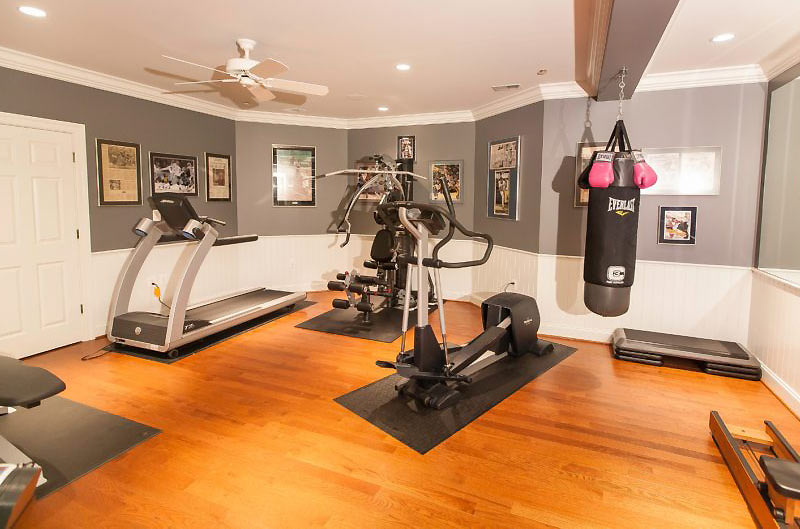
WET ROOMS
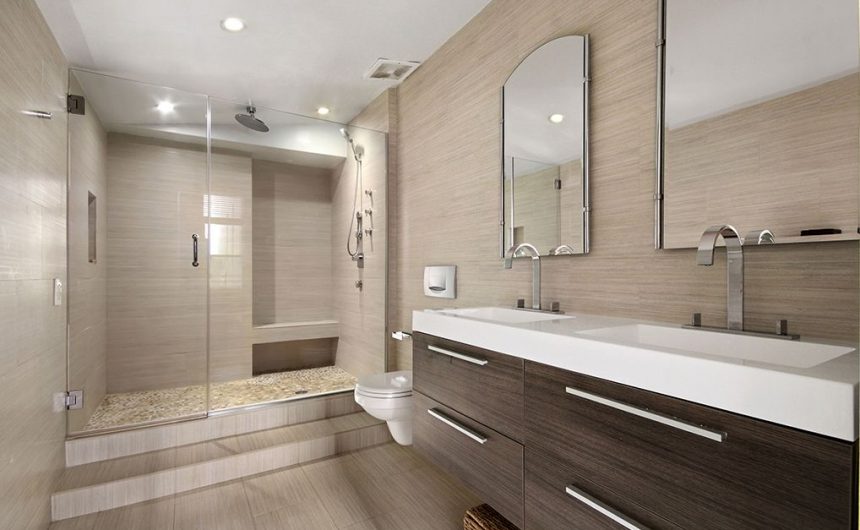
POOLS

Who we are
Our Design & Build services tailor-made to your personal needs, projects delivered and managed by team of:
• Project managers
• Architectural Designers
• Design consultants
• Quantity Surveyors
• Structural Engineers
• Professional Builders.
We take care of everything
APT Renovation offer full-service design and build services:
• Architectural Drawings
• Planning applications
• Building Control
• Project cost estimation
• Detailed architectural CAD / 3D designs
• Construction
Call Us: 0207 223 6417
Email Us: info@aptrenovation.co.uk
Office Opening Hours
Mon 08:00 – 17:00
Tue 08:00 – 17:00
Wed 08:00 – 17:00
Thu 08:00 – 17:00
Fri 08:00 – 17:00
Outside of these hours, please leave a message and we will call you straight back.
If you are an existing client and need to contact us urgently, please call the mobile number of your Project Manager
Get a FREE Quote
[contact-form-7 id=”3350″ title=”Contact form 1″]
Frequently Asked Questions (FAQ)
HOW MUCH WILL A BASEMENT / CELLAR CONVERSION BE?
It is not straight forward because each individual project will be different and will depend on a number of aspects. We need to closely look into multiple factors such as the materials needed, the clients’ vision, the budget and the timeframe before we can give a clear quotation. With that being said, we can give a rough estimate during the site visit meeting. From our previous experience in basements, we can give some understanding of what you might expect:
BASEMENT COSTS:
£2800 – £3200 PER SQ M APPROX.
This figure is a rough idea at what a basement excavation and extension in the Wandsworth area will cost. The range is a correlation between the different level in the finish. There is always the possibility of other costs being incurred when looking at in greater depth.
Considerations as to whether the initial dig out will be possible by machinery or it will be necessary to excavate by hand. This will ultimately be more expensive.
DAMP PROOFING AND DRAINAGE:
£800 – £1200 PER SQ M APPROX.
We use Delta membranes for damp proofing. Depending on the state of the walls and the ground, Damp proofing membranes can be used to full or medium coverage.
IS PLANNING PERMISSION OBLIGATORY?
For the most part, you will not need a planning permission for a basement excavation, as the changes do not breach the area of your building plan and usually wont exceed outside your building understructure. However, there are times when parts of the basement conversion project may require planning permission if it does goes outside of the building plan. Your local council is the first contact point when it comes to the planning permission.
It is always recommended that you should be familiar with basement groundworks requirements before you start planning your project.
DO I GAIN FINANCIAL BENEFITS FROM A CONVERSION?
Not only does adding additional space improve the scale of a living space and boosts comfort, market research shows that you will also gain financial benefit if you wish to sell your property in the future. Basements can be transformed to amazing living spaces such as wet rooms, spas, pools, underground rooms and entertainment rooms with proper ventilation and heating.
We will visit you at your premises to discuss what you would like to create within your new or existing basement space. We are happy to answer all essential questions you may have during our initial visit.
We offer a full service which includes submitting plans right through to the very last detail, or we can just create and extend your basement project from your existing gained plans. APT Renovation will send you a quotation within 8 days.
Planning Permission and Party Wall for Basement Conversion
Basement / Cellar conversion project requires planning permission if you want to:
- Make a dig up and understructure excavation
- make alterations to your building, eg building an extension
- make changes to use of a building
To find out more about your project need planning permission.
Simply contact APT Renovation team.
Please note: If your basement conversion project requires planning permission and you do comply with rules, you can get penalty ‘enforcement notice’ which will enforce to undo all the changes you have made to your basement conversion.
If you are constructing a new basement / ground room and making extensive changes to existing buildings you will be required the permission of your local planning authority to get a planning permission.
This planning system is designed to control inappropriate development.
In this case, APT Renovation can do it for you.
If you planning to excavate and create more space in property or alteration of existing building you will need to apply for planning permission.
Cellar conversion requires planning permission depending on the size meter square of the project and the level of Permitted Development rights afforded to or still remaining on a property.
Permitted Development was first introduced at the beginning of our planning system – in the Town and Planning Act on 1st July 1948.
Which allows making minor changes in building planning, such as converting a loft or extension so in this case, you need to go for full planning permission.
Outline planning permission is not advisable for basement extension or conversion project.
APT Renovation advice you to go full planning permission.
The fee for submitting a planning application varies depending on the nature of the development.
As well as fees for pre-application advice please contact APT Renovation, as we receive your required information in details we can give the exact price.
Each basements has different layout and shape which required to include five copies of planning permission application forms, the signed ownership certificate, a site plan, block plan and elevations of both the existing and proposed sites, a Design and Access Statement and the correct fee.
The statement for basement conversion has to include all planning applications except householder building works which is located at unprotected areas and changes of use.
Statements they show justification of proposal’s basement design concept and the access.
The level of detail depends on the scale of the project and its sensitivity.
Most authorities will have guidance notes available to help you but, unfortunately, this is something which everybody knows how to submit, if you are planning to submit simply contact APT Renovation.
Planning permission directly links with planning conditions which you will need discharging/agreement for your project.
Planning conditions are extremely important and failure to comply with local authorities can result in a breach of condition notice, to which there is no right of appeal — not to mention it could be enforced through the courts by the prosecution.
Conditions can be as simple as a requirement of your project materials to match existing ones, or that all boundary treatments must be agreed.
After our submission of your project application, local authority will make a decision on material considerations, which includes (but are not limited to):
- Highway safety
- Loss of light or overshadowing
- Noise
- Overlooking/loss of privacy
- Traffic
- Government policy
- Impact on listed building and Conservation Area
- Layout and density of building
- Design, appearance and materials
- Disabled access
- Nature conservation
- Proposals in the development plan
- Previous planning decisions
- Parking
While neighbours and parish councils (in England and Wales) are consulted and invited to comment on your design project, only objections based on material, loss of privacy, proposals in development plan considerations are taken into account.
If your neighbours happy with your design project and doesn’t have any objections and the officers recommend approval, you will be granted planning permission for your basement conversion project.
If your basement conversion project has objections or the application elevated into a committee by one of your local councillors, then the decision will be made by a majority vote by the local planning committee.
During the planning meeting, you or your agent (APT Renovation) will be given an opportunity to address the planning committee.
APT Renovation highly recommend you to consult with us prior to buying any plot, to work out the potential of basement conversion project.
By consulting with us you can end up saving thousands of pounds on buying a property that turns out not to be allowed to make groundworks.
Our planning consultant team has extensive experience and full knowledge of the latest planning policies that every basement project requires, and also to prepare planning to create basement conversion in restricted areas such as a Conservation Area or AONB.
Once your planning application for your project has been submitted by APT Renovation, the planning department will check all planning information it requires has been received together with the correct design.
Local authorities can issue planning permission within 8 to 10 weeks of submission.
In some cases signage proposed basement excavation and extension planning will be posted outside you property related to development of your project and any neighbours likely to be affected to be invited to view the plans and to comment.
This is known as the public consultation process and it takes three to eight weeks.
The authority will intitiate statutory consultations with your local Highways department, as well as Environment Agency.
Our experience shows that 85 per cent of applications are granted. If your planning application has been refused, we will take a close look and make amendments to resubmit you application with compliance of local authorities requirements, or you we can make an appeal on your behalf to the planning inspectorate — around 90 per cent of householder applications are later granted at appeal.
Planning permission is normally granted for three years — which means you
Should start your project within this timeframe.
You entitled to make minor alterations by applying for a non-material amendment.
Planning Permission and Party Wall for Basement Conversion
It is illegal to convert or alter your basement without planning permission, If you have failed to get permission for your cellar conversion project, then the local planning authority hold the rights to take action to have project demolished.
In this case, you can apply for retrospective planning application and if you will be refused you can appeal the decision.
There is a very slim chance: if you local authority did not take enforcement action within four years of project completion, the development becomes lawful for change of use and immune from enforcement action (for 10 years). However this is too great a risk to take.
Altering a listed building without any permission is criminal offence, and in extreme cases it can lead to prosecution and unlimited fine charges — and even imprisonment. Please ensure to apply for this first before you start the work
Some of the building projects will not require planning permission. This is known as ‘permitted development rights’.
Building projects that normally have permitted development rights include:
- industrial premises and warehouses – though there are somelimits and conditions
- some outdoor signs and advertisements – though there arespecial rules around these
- demolition – but before you begin you must get approval to demolish fromyour local planning authority
There are other projects that might not need planning permission, eg projects that will have no impact on your neighbours or the environment. If you think this could apply to your project, check with your Local Planning Authority.
If your building project benefits the local community, and the community supports it, you may not have to go through the normal planning permission process. Neighbourhood planning and Community Right to Build lets your community grant planning permission directly under certain circumstances.
Source: https://www.gov.uk/planning-permission-england-wales/when-you-dont-need-it
In general, Building Regulations apply to the construction of new buildings and to extensions and material alterations to buildings. In addition, certain parts of the Regulations apply to existing buildings where a material change of use takes place. Otherwise, Building Regulations do not apply to buildings constructed prior to 1 June, 1992.
You need to ensure if you need planning approval before you start you basement conversion project in London.
Our team here at APT Renovation cover the construction and conversion of basements to meet Building Regulations 2010.
You will need building regulations approval if you are planning to make alteration, which includes:
- any structural work in basement conversion
- replacing the main fuse boxes and connected electrics
- installation of a fixed air-conditioning system
- replacing the new windows and moving door fixtures
- installation of boiler
Speak to our team if you are not sure, whether if you need approval.
You need to make sure the work carried out on you project is fully comply with building regulations.
Without full approval of your alterations you won’t be able to sell your home.
Your neighbours should be notified if you are planning any type of building work near or on your shared property boundary, or ‘party wall’, in England and Wales.
Party walls usually between yourself any your neighbour and sometimes it can be more than 2 owners:
- Party wall can be form part of a building
- Party wall don’t form part of a building, such as a garden wall (not wooden fences)
Walls on one owner’s land used by other owners (2 or more) to separate their buildings are also party walls.
You can also have a ‘party structure’. This could be a floor or other structure, understructure that separates buildings or parts of buildings with different owners, eg flats.
Party wall agreements are different from planning permission or building regulations approval.
If you are planning to start basement conversion, you should comply with Party Walls Act before you get started the work. You need to notify your neighbors of your plans and get their permission for your basement excavation and groundworks. If you are planning to excavate the basement in the terraced or semi-detached property then you will need to notify to your nearest adjoining owner to start the project of any excavation works to walls shared with them. APT Renovation team can give you pieces of advice to serve correct notice in order for it to be valid. You may need to serve more than one notice.
Basement conversion carried out on terraced or semi-detached property directly will affect a party wall on your neighbor both sides, which will require serving a “Party wall structure notice”. During basement conversion you should highlight some examples of the work that you might need to describe in your notice may include:
- extending a party wall downwards;
- strengthening the foundation through underpinning the whole thickness of the party wall; and/or
- cutting away projections such as original bricks.
Basement conversion works always require the use of special foundations. This type of foundations includes underpinning of beams and rods is for the purpose of distributing any load. If special foundations are planned to be placed, it is important to state it in the party walls notice, as it is unlawful to place special foundations under the adjoining owner’s land without their written consent.
It is important to serve your party wall notice to your neighbors and adjoining owner as quickly as possible. You may only start the planned basement conversion work two months after your party wall structure notice is served to your neighbor.
If you are planning to fit a basement excavation work in a detached property, at it is nearest three or six metres of the nearest neighbouring structure then you will be required to serve an “Excavation works notice” to your neighbour. The notice should include a description of your plans and any information regarding the following if they are a part of your plans:
- digging out a basement; and/or
- excavating below a party wall which is to be underpinned.
You should serve your party wall notice at least one month in advance you start any excavation work. If you planning to start basement excavation earlier, you will need to make notice and obtain the adjoining owner’s consent in written form.
APT Renovation advice you to discuss any plans you might have with basement conversion with your neighbour to fit a basement as early on in the process as possible. This will help to solve any concerns or questions your neighbour may have, in order to find out and to avoid neighbours withhold consent.
As per Wall Act notices, the adjoining owner holds full right to consent to any excavation or basement works, your neighbour may refuse consent, or not respond to it at all. If your neighbour is refusing consent, or not responding to your notice, it will clearly mean that your basement works may go into dispute, and the procedures for resolving disputes under the Act come into action.
HOW WE WORK
Free a No Obligation Site Visit / Consultation
APT Renovation will arrange site visit you at your property to discuss what would you like to create within your new or existing basement / cellar. We are happy to answer all essential questions you may have during our initial visit.
APT Renovation can offer a full service which includes submitting plans right through to the very last detail, or we are happy to just create your excavate and build your basement project from your already gained plans.
APT Renovation will ensure to send you a quotation within 8 days.
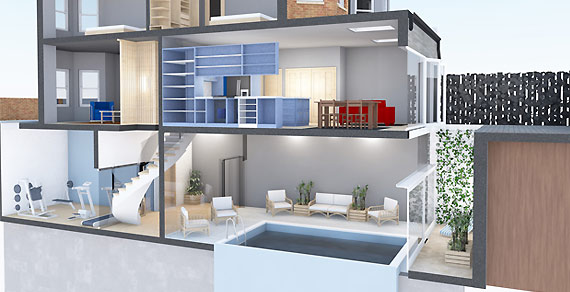
Design Service
If you require a Planning and Design service for your basement conversion project, our in-house Architectural Designers, substructure and groundwork Structural Engineer, and Party Wall Surveyor are at hand to help you visualise your plans and go through them with you until you are completely happy with the final ideas. Our primary concern is to make our clients happy, so every process will be explained to you from beginning to end.
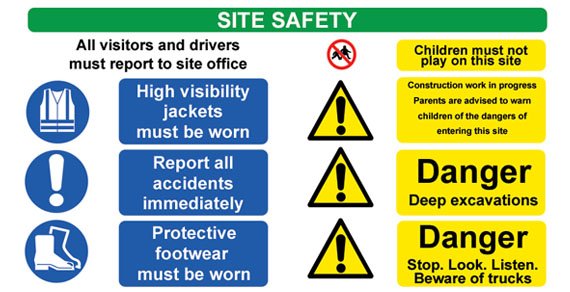
Health and Safety at every stage
Health and Safety is of the utmost importance on every site that we work on, as it not only concerns all of our staff members, but everyone else in the vicinity; including you, your neighbours and even passers-by. Due to the nature of our work, there is always the risk of injury or even death, as ladders, tools and various other materials can be hazardous. Basement conversions in particular are technically very challenging, and can pose a number of different risks, with a large proportion of these projects in London regularly failing safety checks. Unguarded excavations and unprotected floor openings represent serious dangers to all those concerned. That is why our staff are expertly trained and will always diligently adhere to all necessary Health and Safety procedures and issues.
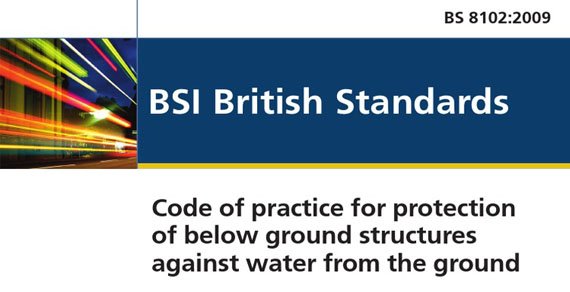
British Standard 8102:2009
British Standard 8102:2009 is the ‘Code of practice for protection of below ground structures, substructures, understructure against water from the ground’. In essence, it is the primary design guide for structural waterproofing and groundworks in the UK, with the recent update being released in November 2009. If you are producing a waterproofing design, or you have advisors that are designing on your behalf, this document should cover every consideration possible. If you have further questions in regards to the BS8102, please feel free to contact us.
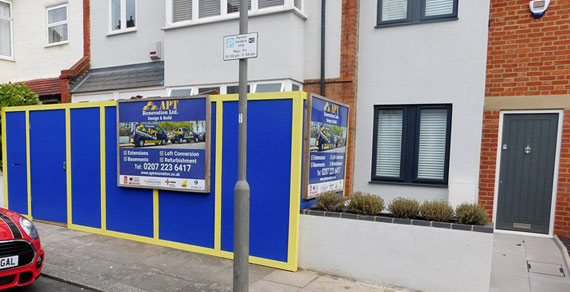
Construction
An intuitive basement construction process will ensure your project will run smoothly and is monitored and overseen by managing director, Andi Pepaj, and managed by our project managers on site.
APT Renovation has over 17 years experience in underpinning and basement excavation adhering to basement standards to a very high-level finish.
You will be advised by your Project Manager who will be on site all day, every day and will be your first point of contact.
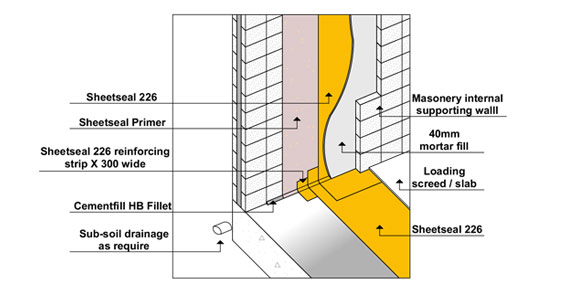
Basement Tanking
Tanking, or ‘Type A barrier protection’ (BS8102 definition), is a specific form of waterproofing of underground rooms and understructures, although it is a common term applied to all forms of waterproofing. In the true sense of the word, tanking means blocking water out of a structure by employing a barrier product which is installed internally, sandwiched within, or applied externally to a structure. Tanking is still widely used and applied in building industry, but has declined in popularity in recent years where retrofit protection is required for existing basements.
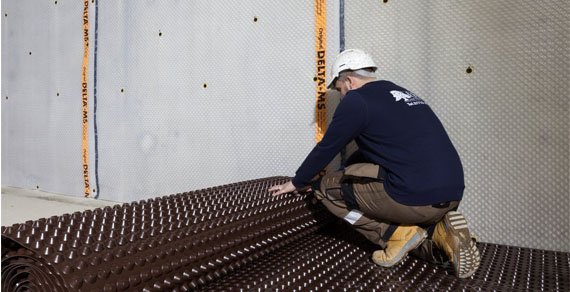
Waterproofing
Waterproofing is a very important aspect in a basement and cellar conversion, particularly as the UK experiences a very high level of rainfall each year. A lack of waterproofing will eventually result in damp on walls, which not only looks bad, poor odours can be detrimental to your hygiene as well, and can cause significant damage to the paint job, the plastering and the finish. Worse still, damp can also lead to breathing problems and other health issues, so it is something that should be eradicated immediately.
APT Renovation Design & Build has had huge success over the years in waterproofing with Delta Membrane Systems and pumps. For basement waterproofing, the Delta sealed system ensures that all membranes are expertly sealed and secured, as well as any protrusions or crevices. Delta Systems are incredibly effective in dealing with adverse water conditions and especially basements that have the propensity to flood. There is a 30-year guarantee on all Delta membrane systems

Fit-Out
Our construction team will be ready to make the underground rooms or space in your basement that you have been dreaming of, come to life. Our dedicated and experienced tradesmen will work tirelessly to complete your project on time with no stone being left unturned. Our aim is for you to be completely happy with the work, and we will only sign off the project once you have deemed it necessary to.

Insurance and Guarantees
APT Renovation hold public liability insurance, and an all risks cover. This will cover you and our builders. APT Renovation Ltd offer a 15 year warranty on all structural work.
With hundreds of basement and cellar extension projects completed to date, APT Renovation has an outstanding reputation for being basement conversion specialists, dedicated to creating state of the art spaces, with immaculate attention to detail.
APT Renovation team are always happy to hear your thoughts about your project, either on the phone or in person.
If you’d like to know more please arrange a FREE no obligation site meeting you.
Call Us: 0207 223 6417
Email Us: info@aptrenovation.co.uk
Office Opening Hours
Mon 08:00 – 17:00
Tue 08:00 – 17:00
Wed 08:00 – 17:00
Thu 08:00 – 17:00
Fri 08:00 – 17:00
Outside of these hours, please leave a message and we will call you straight back.
If you are an existing client and need to contact us urgently, please call the mobile number of your Project Manager
Get a FREE Quote
[contact-form-7 id=”3350″ title=”Contact form 1″]
ROUTINE BUILDING CONTROL CHECKS
A Building Inspector will visit at regular stages throughout the project, their job is to make sure that we are adhering to all the latest substructure and groundwork building regulations. Upon completion of works The Building Inspector will make a final visit and you will be issued with a completion certificate.
Upon final completion you project you will receive following documentation where applicable:
Gas Safety Certificate, Electrical Sign Off Certificate, Drainage Layout, Plans as Built Drawings, Manufacturers Instructions For Appliances, Manufacturers Guarantees For Appliances, 10 Year Structural Guarantee
